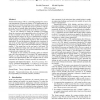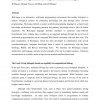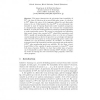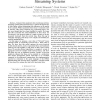272 search results - page 50 / 55 » Programming languages capturing complexity classes |
230
Voted
POPL
2009
ACM
16 years 2 months ago
2009
ACM
Transactional memory (TM) is a promising paradigm for concurrent programming. Whereas the number of TM implementations is growing, however, little research has been conducted to p...
106
click to vote
BIOINFORMATICS
2005
15 years 2 months ago
2005
BioLingua is an interactive, web-based programming environment that enables biologists to analyze biological systems by combining knowledge and data through direct end-user progra...
133
click to vote
ALT
1995
Springer
15 years 5 months ago
1995
Springer
This paper characterizes the polynomial time learnability of TPk, the class of collections of at most k
rst-order terms. A collection in TPk de
nes the union of the languages de
n...
110
click to vote
ICALP
2004
Springer
15 years 7 months ago
2004
Springer
Monadic least fixed point logic MLFP is a natural logic whose expressiveness lies between that of first-order logic FO and monadic second-order logic MSO. In this paper we take ...
241
Voted
ICDE
2009
IEEE
16 years 3 months ago
2009
IEEE
Temporal data analysis in data warehouses and data streaming systems often uses time decay to reduce the importance of older tuples, without eliminating their influence, on the res...




